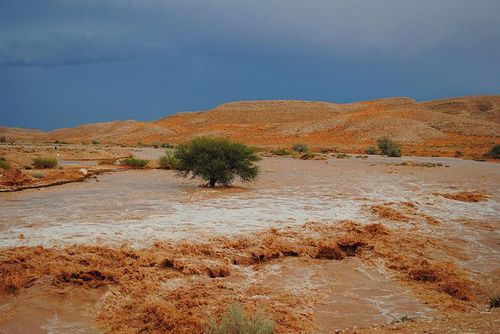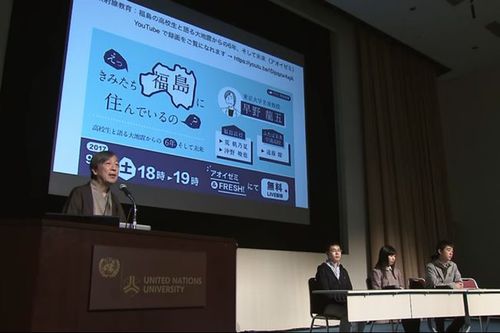Kyoto University Irrigates Desert with Flash Floods

Image by Syed Wali Peeran Some Rights Reserved.
An International Study Group consisting of Kyoto University, Japan and Mutah University, Jordan have started operation of a reservoir using an optimal strategy based on a strict mathematical proof, announced Kyoto University in March 2018. The group proposed an irrigation scheme for harvesting water from floods in a desert and storing the water in the reservoir to use for irrigation. The group actually built a prototype in an arid region of Jordan, and results of the study appeared online in "Stochastic Environmental Research and Risk Assessment," an International Academic Journal, on March 5, 2018.
There have been efforts in the past to establish agricultural water management facilities in harsh environments outside of Japan for academic purposes. However, this study is the first example which examined an operation strategy based on a strict mathematical proof.
The success of this prototype as an interdisciplinary effort between water resources engineering and analysis identifies the scheme as a feasible option for water resource development in harsh environments. In particular, using the concept of a "viscosity solution" to a certain partial differential equation makes it possible to use an optimal operation strategy which does not involve smooth on/off control of the pumps.
Arid regions distributed widely throughout the world, including the Middle East and North Africa, are facing problems such as salt accumulation in and excessive dependence on exotic rivers and fossil groundwater. Establishing irrigation agriculture that effectively uses the limited water resources in such harsh environments has grown more urgent. At the same time, damage caused by unexpected floods is said to have increased, resulting in an even greater need for an irrigation system that addresses these problems.
Japan's Ministry of Environment Uses 'Nudge' Behavioral Science for Low Carbon Initiatives

Image by Camera guy..
Japan's Ministry of the Environment has been testing a new "nudge" policy approach strategy based on behavioral science. This program started in FY2017 with the purpose of reducing CO2 emissions from the household, business and transportation sectors. The "nudge" idea is all about gently pushing people to act. This approach includes, for example, including neighborhood electricity consumption data in electricity bills so that consumers can compare their own electricity consumption with that of others and be motivated to reduce their own consumption.
The ministry took the lead in setting up what it calls a "nudge unit" dubbed the Behavioral Sciences Team (BEST) in April 2017, involving collaboration from industry, academia and the public sector, aiming to quickly mainstream this approach. The team includes companies selected from among applicants for the nudge program as well as related ministries, local governments, and experts.
A consortium of four companies was selected for the FY2017 program. As one example of their work, Oracle Japan and Jukankyo Research Institute Inc. are jointly developing a Japanese-style nudge model that benefits individuals, businesses and local communities.
In FY2017, the first year of the project, the consortium sent out customized home energy reports four times to about 300,000 households, in cooperation with five energy companies such as Hokkaido Gas Co. and Kansai Electric Power Co, and has been measuring the impacts on awareness, motivation, and actual reductions in CO2 emissions. The consortium will continue the project until FY2021 and establish nudge-based models reflecting actual Japanese lifestyles.
The use of behavioral science is attracting attention for its high cost-effectiveness and freedom of response by targeted audiences. The Ministry of the Environment will continue to look at its applicability for ongoing medium- and long-term efforts to move Japan towards being a low carbon society.
Communicating the Current State of Fukushima

Source : Ministry of the Environment
How is the current situation in Fukushima being communicated today, and how are different stakeholders working to shape the message? Here we introduce initiatives in education and the media from Part 2 "How the State of Fukushima Today is Being Communicated - Case Studies" of the panel discussion "Update Fukushima - Support Fukushima by Learning and Sharing with Others" held in February 2018.
Building a Fukushima model for global disaster-recovery education
The Fukushima Ambassador Program being implemented by Fukushima University invites overseas students from affiliate universities on a short-term stay of two weeks. During their stay, they visit disaster-stricken areas together with Fukushima University students to deepen their understanding of past, current, and future issues in Fukushima. Since the start of the program in 2012, visits have been organized 12 times with 154 students participating so far.
Feedback from foreign students in the program include: "I want to tell others about all the great things we learned about Fukushima through the program" and "I want to tell people about not just the lessons from the Fukushima accident, but also how wonderful and warm the people of Fukushima are and all its local charm." A local Japanese student said, "I feel more confident about telling the world about Fukushima."
Fukushima University plans to continue the program and is building a "Fukushima model" for global disaster-recovery education, one that includes training foreigners who want to contribute to Fukushima's recovery by communicating its status and Japanese people who can communicate in English.
Shaping Fukushima's Message in the Age of Social Media
The Discovery Channel created a documentary program to introduce Fukushima's recovery process to a wide audience, particularly to people in Southeast Asia who are interested in Japan. In the documentary, three young people - an environmental scientist, a YouTuber, and a photographer; all social media influencers - visit Fukushima to interview local people and see current conditions firsthand.
The Discovery Channel hopes the program will resonate with viewers as a memorable story that integrates the three interviewers' authentic storytelling with the Discovery Channel's Hollywood-style journalism.
Reaching overseas audiences through television
Aired in 18 Asian countries, TV-U Fukushima broadcast a special documentary on the current state of Fukushima as part of a regular program introducing the Japanese economy, business, culture and trends. Through the documentary, TV-U Fukushima hopes to present Fukushima in a manner true to life.
Evaluate, know, learn and communicate
Three high school students from Fukushima spoke at the University of California, Berkeley, in October 2017 to share lessons from the disaster and Fukushima's message for the future. A total of 122 people including Berkeley students and university staff participated in the event, which was covered by many international media.
The three students commented, "It's important to have a general understanding not only about the existence of radiation but also its quantity. I hope people will keep offering their attention to Fukushima, but with the right knowledge," "People will be left with a positive impression of Fukushima if we talk about its charms and positive attributes, so I will continue to tell people in Japan and around the world about Utsukushima Fukushima (Beautiful Place, Fukushima)," and "Even people coming from the same Fukushima prefecture will naturally have different experiences in the disaster and see their futures differently. I would ask that you learn about Fukushima with a flexible mind."
What's New This Week from JFS (3 - 9 Jul. 2018)
This month's cartoon:"Transfer of the leading role" (2018/7/9)
https://www.japanfs.org/en/manga/manga_id036113.html
Japan for Sustainability (JFS) is a non-profit communication platform to
disseminate environmental information from Japan to the world. We are
grateful that people in 191 countries have found an interest in our free
e-mail publications, and will continue to do our best to deliver useful
information to our readers all around the globe.
Please feel free to forward this message to your colleagues and friends
wherever the Internet can reach. If you know colleagues or friends there
with an interest in sustainability, please do forward them one of our
newsletters and invite them to try our service. To subscribe for JFS
Newsletters, visit www.japanfs.org/en/newsletter/subscribe.html

If you find our information and activities unique and valuable,
we appreciate your support!
http://www.japanfs.org/en/join/donation.html

Use this form http://www.japanfs.org/acmailer/unsubscribe.html to
remove your email address from our mailing list.

We welcome your comments. Please send them to: info@japanfs.org

Japan for Sustainability (JFS)
 |  |  |
Copyright (c) 2018, Japan for Sustainability. All Rights Reserved.

